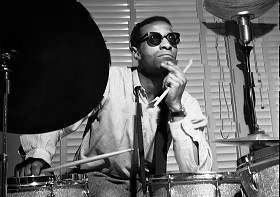Here are some tips for a rock drummer who wrote to me wanting to begin learning jazz, but is unsure how to go about it:
1. Play a lot. With people. Everything you do as a drummer follows from this, so it’s important to be playing with people from earliest possible stage- as soon as you can play a swing beat. Or sooner- I actually didn’t know how what a swing beat was, exactly, when I first got into jazz band in school. You learn very quickly when you’re put on the spot. Don’t become so focused on practice and preparation that you don’t do this.
2. Listen to a lot of jazz. Usually people start with whatever turns them on, plus the more famous recordings of the 1950’s and ’60’s. Building a record collection and generally having a lot of curiosity about the music are universal things among jazz musicians.
3. Go to jazz gigs. You need to see how drummers play the actual gigs you’ll be playing in your own town. YouTube clips are good, but they don’t tell you how to do that. This is also how you meet the people who you’ll be playing with, your teachers, and your audience.
4. Learn tunes. The easiest way to do this is to play with people, but you should do some homework, too. You could start with these Charlie Parker tunes, or just attack A Blog Supreme’s list of the “top” 100 jazz tunes. Learning a tune means, for starters, that you can sing the melody (badly, even) from memory, play the rhythm on the snare drum, and can recognize it when you hear it; and that you know the form of the tune (12 bar blues and 32 bar AABA are common examples), as well as any common kicks/stops, and the usual tempo and style. You can view lead sheets for just about any tune you’ll want to learn at Jazz Planet.
5. Get a teacher. Preferably the best jazz drummer in your town who is also a good teacher, who you also feel clicks with you personally (hopefully). He can keep you focused on what’s actually important (have you noticed the myriad of distracting, non-essential drumming crap thrown at you every day?), can find different ways of teaching you things you’re having trouble with, can give you instant feedback, and correct big misconceptions (of which you will have many). Books and videos are great and necessary, but they can’t do these things.
6. Be a part of a program. If you’re still in school, be in the band program. You’ll get a little bit of playing and performing in, meet people to play with outside of school, and learn from the other students who are better than you.
7. Get your general musical and drumming skills together. Get proficient with reading music, learn your rudiments, and practice your concert snare drum. Participating in concert band, orchestra, and/or marching band is a good idea. Getting at least a basic understanding of the tonal world- scales, chords, and such- is also helpful.
8. Practice. Most jazz musicians are serious lifetime practicers, and you’ll need to go through at least a period of years where you dedicate a lot of time and energy to it.
Being overwhelmed by the amount of stuff to work on is sort of a natural state for jazz musicians, but try to be. Just put one foot in front of the other- if you’re generally participating in all of the above things and working hard, it will happen.


Leave a Reply
You must be logged in to post a comment.